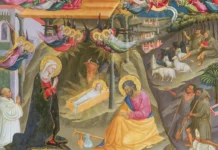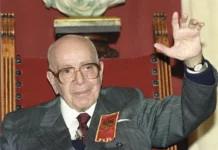As Dr. Plinio delved deeper into the various aspects of the Carmelite history and charism, he perceived the wisdom of the supernatural inspiration which had led him to make the promise of joining the Order.

“A ll my life I have felt an extraordinary affinity with the Order of Carmel and have had the desire to belong to it, based largely on its prophetic aspect, because it is the prophetic Order par excellence,” affirmed Dr. Plinio Corrêa de Oliveira.
From the enchantment born in the initial steps of his Catholic militancy, during a procession of Carmelite tertiaries, and from the promise which arose from this of one day joining the Order of Carmel, various factors concurred to increase this yearning: “I began to read the great Carmelite Saints: St. Teresa of Avila, St. Therese of the Child Jesus, something of St. John of the Cross and others, and this greatly impressed me. Even more so when I read that the prophet Elijah was the founder of the Order of Carmel and, with the vision of the little cloud, he was the first to have the revelation about the Virgin who was to come. All this gave me a great desire to become a Carmelite.”
Like all the relevant episodes of his life, this one was prepared by various providential circumstances. Among them is the fact that he began to work as a lawyer for the Carmelite Province of Rio de Janeiro, thus initiating a relationship that would go far beyond the mere professional, for Dr. Plinio soon developed a strong friendship with the Father Provincial and other Carmelite friars. They were all Dutch and, when they came to visit him in his office, the preferred topic of conversation was, consequently, their native country.
One day, however, Dr. Plinio asked them about the possibility of being admitted to the Order of Carmel.
Tertiary of the Venerable Order of Carmel
At that time, the Carmelites had not yet founded the Third Order in the convent located on Martiniano de Carvalho Street in São Paulo. But, as soon as that took place, Dr. Plinio asked for admission, together with a group of his disciples, taking the name Brother Isaiah of Our Lady of Perpetual Help.

He explained that he chose this invocation of the Blessed Virgin so that, in the midst of the struggles in which he found himself, “She would perpetually protect me” and “help me to fulfil my duty,” in his words.
Having constituted a sufficient number sharing the same aspirations, on February 2, 1954, with the consent of the Father General of the Carmelites, Fr. Kiliano Lynch, Dr. Plinio’s sons formed a sodality, called Virgo Flos Carmeli, of which he would be elected first prior. Thenceforth, all the new disciples recruited to join the ranks of the Group1 over the years would enter this sodality.
As Dr. Plinio delved more deeply into the various aspects of the Carmelite history and charism, and noted their intimate connection with his mission, he perceived the wisdom of the supernatural inspiration which had led him to make the promise of joining the Order two decades earlier.
By virtue of the supernatural union established with the Holy Church since his earliest childhood, Dr. Plinio fully appreciated the immense spiritual fruit for his work that would result from the effective juridical bonding of its members with a family of souls so privileged by the Blessed Virgin Mary:
“Our belonging to the Third Order of Carmel is a complement and natural integral element, adequate from every point of view and with profound reasons, of our belonging to the Group. Both things form a whole and a union. In this sense, we must have the highest regard not only for our duties as Carmelites, but also for the great benefits we enjoy as such. The fact that this establishes a juridical bond between Our Lady and us, which She has mercifully willed to set up, entitles us to be her sons and slaves for a very special reason, and therefore to ask Her for whatever we desire, with particular confidence.”
Burning zeal for the Lord God of hosts
In the very first ceremonies in which he participated as a member of the Third Order, Dr. Plinio saw the brilliance of the personality of St. Elijah shine before him, a fact that shows his soul’s profound harmony with the purest and most authentic core of the Carmelite ideal.
Before Sunday Mass, the tertiaries formed a procession which filed down the side aisles of the Basilica of Carmel before finally taking their place in the front pews, and from there they participated in the Holy Sacrifice. As the procession advanced, Dr. Plinio’s gaze fell on a mural painting depicting the episode in which St. Elijah, having spent the night in a cave, is visited by God who asks him: “What are you doing here, Elijah?” (1 Kgs 19:9). There, on the mural, the prophet’s reply was written in Latin: “Zelo zelatus sum pro Domino, Deo exercituum”2 (1 Kgs 19:10).
When he read that sentence which, although he did not yet know it, constitutes the motto of the Order of Carmel, he felt a tremendous impact, as he recounted: “A burning and extraordinary zeal! I had an experience that completely filled me with enthusiasm and gladness, but also with the assurance that those words of the Holy Spirit in the Old Testament were a eulogy of how one should be, and that if a man were to became zealous, but with a fiery zeal, for Him who is the Lord God of hosts, he would be extraordinary and would fulfil the demands of God’s love”; “That is precisely what I would like to be able to say of myself. Zelo zelatus sum, but for God, above all, as God of hosts. That is to say, God in the combat, God in militancy, God in the fight.”
Admiring the Eliatic line
Dr. Plinio’s admiration of the Eliatic vocation did not stop there. The Tishbite was the only prophet left in his time, for the others had been killed by Ahab and Jezebel or had sold themselves to the sect of Baal. However, God had not abandoned the chosen people, for Elijah embodied the faithfulness of all Israel. And for all the centuries to come, he will represent, within the Church, the zeal for integrity and truth. All the just eulogies that Scripture pays him are weighed, counted and measured, but one of them especially calls our attention in this context: “Blessed are they that saw thee, and were honoured with thy friendship” (Ecclus 48:11). [DR]

Among these chosen ones is Elisha who, when the prophet was carried away by a fiery chariot, received a double share of his spirit (cf. 2 Kgs 2:9-11; Ecclus 48:13). Does this not mean that there is a spirit of Elijah that is transmitted?
This is what is observed when, later on, graces of the same mould would shape the mentality and mission of St. John the Baptist (cf. Mt 11:14; Lk 1:17) and of so many other Saints: “Elijah appears as the first to devote himself to Our Lady and as the one who will intervene in her decisive battles in the struggle against the Antichrist. He is her great devotee. He, the bearer of a grace, of a spirit, is at the head of a series of luminaries of Marian devotion. He is the initiator of a Marian grace, which is a foreshadowing of the grace of the advent of the Word. […] Then, proceeding to others, we see that the growth of Mariology and devotion to Our Lady in the Church reaches its highest expression in St. Louis-Marie Grignion de Montfort.”
This led Dr. Plinio to raise the hypothesis that St. Elijah opened a current of prophets throughout history, closely linked to the Carmelite spiritual family, which he called the Eliatic line. Its origin and support are found in the mentality, spirit, way of being, patience, humility and zeal for God’s cause shown by the “father and guide of Carmel” himself.
Therefore, when speaking of him, Dr. Plinio did so from the depths of his soul, admiring him as the founder of this school of spiritual life: “Within a nebulous area that offers us few but very important historical facts, everything is suggestive of a great concatenation, of a great line of souls that are connected to one another. […] We perceive that this forms an immense vein which, seen as a whole, ultimately presents itself as a unity of men who touched each other with at least the tip of their finger.”
Within the fabric of history, it was necessary for God to create continuity among those who would maintain the orthodoxy and observance of the Law throughout time, not by their own efforts, but thanks to a fidelity infused by Him. In this sense, would not Dr. Plinio’s entry into the Third Order of Carmel have been permitted by Providence as a way of fostering his mystical relationship and that of his work with the prophet par excellence, and his full identification with the Eliatic spirit? ◊
Taken, with abridgements, from:
O dom de sabedoria na mente, vida e obra de [The Gift of Wisdom
in the Thought, Life and Work of] Plinio Corrêa de Oliveira.
São Paulo: LEV, 2016, v.III, p.304-317
A Country that is Great through Faith

A Country that is Great through Faith
Brazil’s mission consists in lovingly illuminating the world with the “lumen Christi” that the Church radiates. Blessed is this sober and detached people, for theirs is the Kingdom of Heaven!
Plinio Corrêa de Oliveira
It would not be too daring, perhaps, to affirm that God placed the peoples of His choice within panoramas that are appropriate for the accomplishment of the great destinies to which He calls them. And there is no one who, travelling through our Brazil, does not experience the vague impression that God has destined this country as the setting for great feats. Its dramatic mountains and mysterious cliffs seem to invite man to the supreme audacities of Christian heroism, its verdant plains seem intent on inspiring the emergence of new artistic and literary schools, new forms and types of beauty, and on its coastline the seas seem to sing the future glory of one of the largest peoples on earth. […]
And today, as Brazil emerges from its adolescence into full maturity, and the sceptre of Christian culture, which totalitarianism would like to destroy, totters in the hands of Old Europe, it becomes clear to all that the Catholic countries of America are in reality the great granary of the Church and of civilization, the fertile ground in which the vegetation being destroyed by barbarism in the Old World can flourish with greater brilliance than ever before. The whole of America is a constellation of fraternal peoples. In this constellation, it would be pointless to say that the physical dimensions of Brazil are not an image of the magnitude of its providential role. […]
The providential mission of Brazil consists in growing within its own borders, in unfolding the splendours of a genuinely Roman Catholic and Apostolic civilization here, and in lovingly illuminating the entire world with the torch of this great light, which will truly be the lumen Christi that the Church radiates. Our kind and hospitable nature, the plurality of races that live here in brotherly harmony, the providential contribution of the immigrants who so intimately integrated themselves into the life of the nation, and above all the norms of the Holy Gospel, will never make of our longing for greatness a pretext for narrow-minded Jacobinism, for senseless racism, or for criminal imperialism. […]
Brazil will not be great through conquest, but through faith; it will not be rich through money as much as through generosity. […]
Blessed is this sober and detached people, despite the splendour of their wealth, for theirs is the Kingdom of Heaven.
Blessed is this generous and welcoming people, who love peace more than riches, for they possess the earth.
Blessed is this people with a heart that is sensitive to the love and sorrows of the God-Man, to the sorrows and love of their neighbour, for they will thus be consoled.
Blessed is this virile and strong people, intrepid and courageous, hungry and thirsty for heroic and complete virtues, for their appetite for holiness and supernatural grandeur will be satisfied.
Blessed is this merciful people, for they will obtain mercy.
Blessed is this people who are chaste and clean of heart, blessed is the inviolable purity of their Christian families, for they will see God.
Blessed is this people of peace, of idealism free from Jacobinism and racism, because they will be called children of God.
Blessed is this people who take their love for the Church to the point of fighting and suffering for her, for theirs is the Kingdom of Heaven.◊
Taken from: Greeting to civil and military authorities.
In: Legionário. São Paulo. Year XVI. N.525 (Sept. 7, 1942); p.2
Notes
1 When, at the beginning of the 1930s, Dr. Plinio formed an incipient group of disciples, the expression Plinio’s Group arose in Catholic circles. The expression took such hold internally that, decades later, the word Group continued to be used to designate the ensemble of his work.
2 From the Latin: “With zeal have I been zealous for the Lord God of hosts.”







